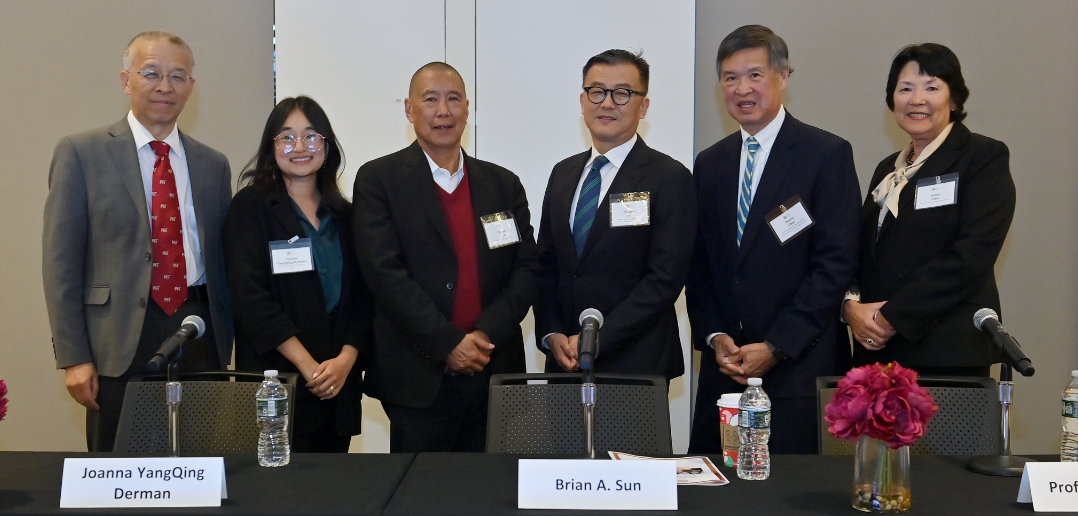Joanna YangQing Derman, Brian A. Sun, Professor Thomas Lee, Judge Denny Chin ’78, and Kathy Hirata Chin
The Center on Asian Americans and the Law’s Third Annual Fall Symposium shined a light on the under-explored history of accusations of espionage against Asian Americans, delving into historical cases and present-day policies.
Judge Denny Chin ’78 and Professor Thomas Lee, the Center’s co-directors, reviewed three historic cases targeting Asian Americans dating back to World War II. They included the 1949 treason trial of Iva Toguri D’Aquino (also known as the “Tokyo Rose”), the 1950 spying accusations against Professor Qian Xuesen of Caltech, and the 1999 allegations against Los Alamos scientist Wen Ho Lee. Following the historical presentation, Professor Lee moderated a panel that reviewed more recent developments, including the China Initiative, a 2018 policy criticized for racially profiling Chinese Americans.
“This is a very important panel in which we will explore a troubling history of accusations against Asian Americans as spies or as subversive elements, and the ongoing implications of that history,” said Dean Joseph Landau. “A pattern of suspicion that has surfaced repeatedly in our history—often as a result of xenophobia, political tensions, and racial biases, the stories that we’ll hear tonight illustrate how public and media pressures, rather than evidence—has driven accusations, leading to arrests, trials, and convictions.”
This was the third in a series of annual symposia held by the Center on Asian Americans and the Law on themes of interest to Asian Americans as well as others. Previous symposia have covered topics such as Asian Americans and education, touching on school integration and affirmative action, as well as both historic and contemporary civil rights issues involving Asian Americans, including anti-Asian violence during the COVID-19 pandemic. The Center also regularly hosts film screenings, reenactments of significant cases, conversations with judges, and workshops to facilitate the teaching of Asian American legal history.
Judge Chin’s presentation included a review of the “Tokyo Rose” case—the prosecution of Iva Toguri D’Aquino. Toguri was born in Los Angeles to Japanese-American parents, and traveled to Japan in 1941 to help take care of a sick aunt. After the attack on Pearl Harbor, when war broke out, she was not allowed to return to the United States. Toguri found work as a typist at a Japanese government radio station where she later became an on-air disc jockey.
After the war, Toguri was arrested for treason for “adhering to, and giving aid and comfort to, the Imperial Government of Japan during World War II”‘ through her radio broadcasts. She was later released due to insufficient evidence, but after a public outcry she was arrested again, convicted of treason, and went on to serve six years in prison. In the 1970s, the case was re-examined, and in 1977, Toguri was pardoned by President Gerald Ford.
“A common theme here, of course, is that these cases should never have been brought, and unfortunately, this theme has continued,” said Judge Chin, a senior judge on the U.S. Court of Appeals for the Second Circuit. “In recent years, more cases have been brought against Asian Americans with great fanfare, with accusations of spying and espionage, and many were dropped or dismissed.”
The panel took a turn from the historical to the personal, as Professor Gang Chen, director of the Pappalardo Micro and Nano Engineering Laboratories at MIT, recounted being the subject of a federal investigation on suspicion of espionage, but was later cleared of all wrongdoing. Chen, a naturalized U.S. citizen, was arrested in 2021 for allegedly concealing his affiliations with China, an experience that deeply affected his ability to pursue his research even after the case was dismissed.
Said Chen of his time under federal investigation, “I feel that I had a beautiful American dream. I would never have imagined that my dream would turn into a nightmare.”
The panel, which was moderated by Professor Lee, also featured Brian A. Sun, a partner at Norton Rose Fulbright who had represented Dr. Wen Ho Lee, and Joanna YangQing Derman, Director of the Anti-Profiling, Civil Rights, and National Security program at Asian Americans Advancing Justice.
The event drew some 200 attendees, half in person and half on-line, including students, professors, lawyers, and other individuals from the community.

